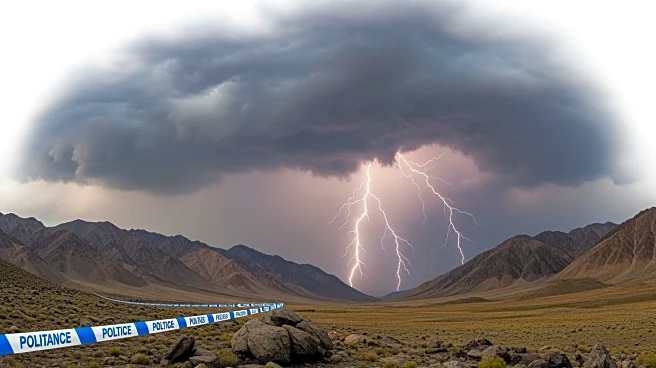What's Happening?
Israeli jets have conducted airstrikes on three towns in southern Lebanon, marking an escalation in the ongoing conflict with Hezbollah. The strikes targeted Tayba, Tayr Debba, and Aita al-Jabal, areas
identified by Israel as hosting Hezbollah military infrastructure. The Israeli military has warned residents to evacuate these areas, citing the use of residential buildings by Hezbollah. This development follows Hezbollah's call for the Lebanese government to avoid negotiations with Israel. The conflict traces back to the October 7, 2023, Hamas-led attack on Israel, which led to a broader war involving Hezbollah. Despite a U.S.-brokered ceasefire in November 2024, both sides have accused each other of violations, with Hezbollah continuing to fire rockets into northern Israel, prompting Israeli retaliatory strikes.
Why It's Important?
The intensification of Israeli airstrikes in southern Lebanon underscores the fragile nature of the ceasefire and the persistent volatility in the region. This escalation could have significant implications for regional stability, potentially drawing in other actors and complicating diplomatic efforts. The ongoing conflict affects civilian populations, with infrastructure damage and displacement risks. For the U.S., which has historically played a mediating role, the situation presents a diplomatic challenge, as it seeks to balance its alliances and promote peace. The conflict also impacts global energy markets, given the proximity to key oil-producing regions, and could influence U.S. foreign policy priorities in the Middle East.
What's Next?
The situation may lead to increased international diplomatic efforts to de-escalate tensions and reinforce the ceasefire. The Lebanese government, under pressure from Hezbollah and its own political dynamics, may face challenges in negotiating with Israel. The U.S. and other international actors might intensify their engagement to prevent further escalation. Additionally, humanitarian organizations could increase their presence to address the needs of displaced populations and infrastructure rebuilding. The potential for further military engagements remains high, with both sides preparing for continued conflict.
Beyond the Headlines
The conflict highlights the complex interplay of regional politics, with Iran's support for Hezbollah and the broader geopolitical tensions involving Israel. The situation raises ethical concerns about civilian safety and the use of populated areas for military purposes. Long-term, the conflict could influence regional power dynamics, potentially affecting alliances and the balance of power in the Middle East. The persistent instability may also impact cultural and social relations within Lebanon, as communities navigate the challenges of conflict and displacement.









